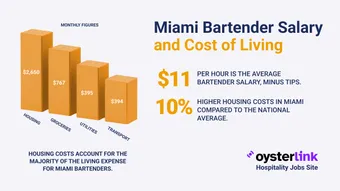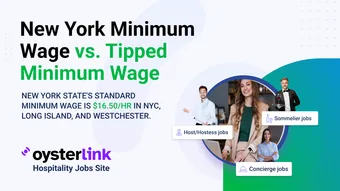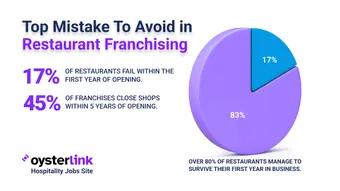The Restaurant Manager’s role is important for keeping operations running smoothly, from handling staff and customer service to managing inventory and finances. But one common question for those looking to step into leadership is: “How old to be a Restaurant Manager?”
The answer depends on state labor laws, alcohol regulations and individual restaurant policies. While some establishments set the minimum age at 18, others require Restaurant Managers to be at least 21, especially if alcohol sales are involved.
If you're looking to work as a Restaurant Manager, here’s what you need to know about legal requirements, industry expectations and how to start your path.
Legal Age Requirements for Restaurant Managers
There’s no universal minimum age for Restaurant Managers in the United States. However, most employers set 18 as the minimum age, while some require managers to be at least 21. The biggest factor is whether the restaurant serves alcohol.
- Restaurants that don’t serve alcohol: Many states allow 18-year-olds to take on management positions in restaurants that focus solely on food service.
- Restaurants that serve alcohol: Some states require Managers to be at least 21 if they oversee alcohol sales, even if they don’t serve drinks themselves.
For example:
- In California, individuals must be at least 18 to serve alcohol but 21 to be a Bartender. Restaurant Managers who oversee alcohol service may also need to be 21.
- In Texas, Restaurant Managers must be at least 18. However, if they’re between need 18 and 20, they often need a Texas Alcoholic Beverage Commission certification to oversee alcohol sales.
- In Florida, there is no specific age requirement to be a Restaurant Manager, but those handling alcohol must follow the state's minimum age laws for serving drinks.
Since rules vary by location, it’s always best to check state and local laws on labor and liquor service before applying for a restaurant management position.
Experience vs. Age: What Matters More?
While some restaurants set a minimum age for Restaurant Managers, experience often carries more weight than age alone. Many Restaurant Managers start in entry-level positions and work their way up by proving they can handle responsibility.
Someone who starts as a Host/Hostess or Server at 16 and consistently takes on leadership roles could be ready for management by 18 or 19, even in restaurants that typically prefer older candidates.
Another factor to consider would be the type of restaurant management you’re aiming for.
A Restaurant General Manager for a large brand will likely need more years of leadership experience. Meanwhile, Shift Managers or Assistant Restaurant Managers often start in their early 20s — or even younger — if they’ve proven they can handle responsibility.
What Restaurants Look for in a Manager
Most employers care about whether a candidate has the right skills to lead a team and keep operations running smoothly. Some of the most important qualities include:
- Leadership and problem-solving: Restaurant Managers need to handle scheduling conflicts, customer complaints and operational issues under pressure.
- Strong communication skills: The ability to clearly delegate tasks, train employees and interact with customers is key.
- Industry knowledge: Understanding restaurant flow, food safety and hygiene and inventory management is more important than age.
- Work ethic and reliability: Employers want Managers who show up on time, take initiative and can be trusted to handle responsibilities without supervision.
How Long Does It Take to Become a Restaurant Manager?
There’s no set timeline, but many Restaurant Managers reach the position within a few years of starting in hospitality.
Typically, fast-food chains promote Shift Leaders to Assistant Restaurant Managers within a year. On the other hand, full-service restaurants may look for candidates with two to four years of prior relevant experience.
Ultimately, while age might be a factor in some restaurants due to legal restrictions, experience, leadership skills and a strong work ethic are what truly determine who gets promoted to management.
How To Become a Restaurant Manager at a Young Age
If you want to move into management early, start preparing while you’re still working entry-level jobs. Below are some steps you can take to prove to your boss or prospective employer that you’re ready.
- Express your interest early on: Go ahead and let your boss or employer know that your goal is to become a Restaurant Manager. Many establishments prefer to promote from within, so don’t be afraid to ask what steps you need to take to earn a promotion.
- Take on supervisory or leadership tasks: You don’t have to wait for a promotion to start acting like a leader. Offer to train new employees or handle small managerial tasks like opening/closing duties and shift scheduling. Another way would be offering to help in different areas when the team is short-staffed.
- Get certified: Many restaurants require Managers to have certifications related to food safety and alcohol service (e.g., ServSafe Manager and TIPS). Having these certifications before applying for a management role shows initiative and a commitment to the industry.
For the complete steps, read our guide on How To Become a Restaurant Manager.
Challenges of Being a Young Restaurant Manager
Becoming a Restaurant Manager at a young age is an impressive achievement, but it also comes with unique challenges.
Leading a team, handling various customers and ensure smooth operations can be tough for anyone, but younger Managers often face additional hurdles. Here’s what to expect and how to overcome these obstacles.
1. Earning respect from older employees
One of the biggest challenges young Restaurant Managers face is overseeing a team that includes people who may be significantly older or have more industry experience.
Some employees may doubt your ability to manage them, assuming that your age means you lack the necessary knowledge or leadership skills.
How to overcome it:
- Lead by example: Show that you're willing to do the hard work alongside your team, whether that means jumping in to help during busy shifts or handling difficult situations with professionalism.
- Be confident but humble: You don’t have to pretend to know everything. Acknowledge experienced employees' insights and ask for their input when appropriate.
- Prioritize professionalism: Avoid trying to be "friends" with employees just because you're close in age. Instead, focus on being a fair and supportive leader.
2. Managing a team for the first time
Young Managers often have little to no experience overseeing a team. Learning how to delegate, resolve conflicts and keep employees motivated can be a steep learning curve.
How to overcome it:
- Understand different leadership styles: Some employees respond well to direct instructions, while others prefer a more collaborative approach. Learn what works best for your team.
- Develop strong communication skills: Clear expectations, constructive feedback and active listening go a long way in building a positive work environment.
- Stay calm under pressure: If an issue arises, take a moment to assess the situation before reacting. Rash decisions can damage team morale.
3. Handling difficult customers and situations
Customers can be demanding, and some may challenge your authority because of your age. You’ll also need to deal with complaints, refunds and sometimes even difficult staff situations.
How to overcome it:
- Stay professional and composed: Customers will take you more seriously if you handle situations with confidence and respect.
- Rely on company policies: If a customer questions your authority, refer to restaurant policies rather than making it personal.
- Know when to escalate an issue: If a situation becomes too heated, it’s okay to involve the restaurant owner or a higher-level Manager when necessary.

4. Balancing authority and approachability
As a young Restaurant Manager, you may struggle to find the right balance between being respected and being approachable. Being too strict can make employees resentful while being too lenient can lead to a lack of discipline.
How to overcome it:
- Set clear expectations: Let employees know what you expect from them in terms of performance, behavior and teamwork.
- Hold everyone accountable, including yourself: Enforcing rules fairly will show that you’re a leader, not just another coworker.
- Be available for support: Employees should feel comfortable coming to you with concerns, but they also need to know you’re the one in charge.
5. Learning to make tough decisions
Being a Restaurant Manager means making difficult decisions — whether it's writing up an employee, cutting someone’s hours or dealing with a staffing shortage.
Younger Managers may hesitate to take these steps, fearing they’ll upset coworkers or make the wrong call.
How to overcome it:
- Follow company policies: When making tough decisions, base them on company guidelines rather than personal feelings.
- Ask for guidance: If you’re unsure about a decision, seek advice from more senior Managers or mentors.
- Accept that not everyone will be happy: Leadership means making choices that benefit the restaurant, even if they’re unpopular.
6. Handling work-life balance and burnout
Many young Managers put in long hours to prove themselves, often working late nights, weekends and holidays. This can lead to burnout, especially if you’re trying to juggle work with school or personal commitments.
How to overcome it:
- Learn to delegate: You don’t have to do everything yourself. Trust your team to handle tasks so you don’t burn out.
- Set boundaries: While being available is important, constantly working extra hours can quickly lead to exhaustion.
- Take care of yourself: Prioritize rest, exercise and personal time to maintain energy and motivation.
How Old To Be a Restaurant Manager? – Conclusion
While some restaurants have age requirements for Managers due to liquor laws, most prioritize experience and leadership skills over age alone.
So, if you want to move into management early, focus on gaining experience, learning the business and proving you can handle the job.

Before applying, check your state’s labor laws and talk to industry professionals about what it takes to succeed.
For more insights on career growth in hospitality, stay tuned to OysterLink for expert advice, job opportunities and other resources to help you step into a management role — even at an earlier age.







